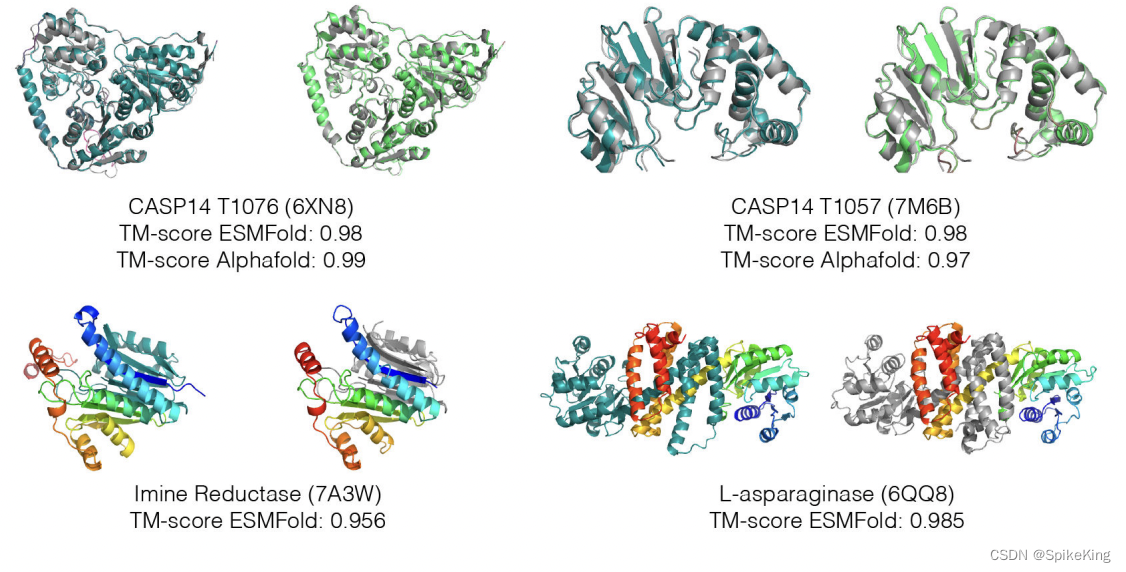欢迎关注我的CSDN:https://spike.blog.csdn.net/
本文地址:https://spike.blog.csdn.net/article/details/134709211

使用 ESMFold 推理长序列 (Seq. Len. > 1500) 时,导致显存不足,需要设置 chunk_size 参数,实现长序列蛋白质的结构预测,避免显存溢出。
ESMFold:https://github.com/facebookresearch/esm
测试 ESM 单条 Case,序列长度 1543 较长,即:
python -u myscripts/esmfold_infer.py \
-f fasta_446/7WY5_R1543.fasta \
-o mydata/test_gpcr/
A100 显存溢出:
Tried to allocate 54.74 GiB (GPU 0; 79.32 GiB total capacity; 73.53 GiB already allocated; 3.94 GiB free; 74.24 GiB reserved in total by PyTorch)
解决显存问题,参考:Out of memory - upper limit on sequence length?
关键参数:chunk-size
Chunks axial attention computation to reduce memory usage from O(L^2) to O(L). Equivalent to running a for loop over chunks of of each dimension. Lower values will result in lower memory usage at the cost of speed. Recommended values: 128, 64, 32. Default: None.
将轴向注意力计算分块 (Chunks) ,将内存使用量从 O(L^2) 减少到 O(L)。 相当于在每个维度的块上运行 for 循环。 较低的值将导致内存使用量降低,但代价是速度。 建议值:128、64、32。默认值:无。
关键参数:max-tokens-per-batch,即 max_tokens_per_batch
Maximum number of tokens per gpu forward-pass. This will group shorter sequences together for batched prediction. Lowering this can help with out of memory issues, if these occur on short sequences.
每个 GPU 前向传递的最大令牌数。 这会将较短的序列分组在一起以进行批量预测。 如果内存不足问题发生在短序列上,降低此值可以帮助解决这些问题。
将 chunk-size 设置成 128,问题解决,即:
max_len = 1200
# A100 最多支持 1200 长度的序列
if len(seq) > max_len:
chunk_size = 128
print(f"[Warning] seq length is too long! {len(seq)} > {max_len}, chunk_size: {chunk_size}")
self.model.set_chunk_size(chunk_size)
else:
self.model.set_chunk_size(None)
with torch.no_grad():
output = self.model.infer_pdb(seq)
推理脚本:
扫描二维码关注公众号,回复:
17237949 查看本文章


#!/usr/bin/env python
# -- coding: utf-8 --
"""
Copyright (c) 2022. All rights reserved.
Created by C. L. Wang on 2023/7/5
"""
import argparse
import os
import sys
import time
from pathlib import Path
import torch
from tqdm import tqdm
import esm
p = os.path.dirname(os.path.dirname(os.path.abspath(__file__)))
if p not in sys.path:
sys.path.append(p)
from myutils.protein_utils import get_seq_from_fasta
from myutils.project_utils import time_elapsed, mkdir_if_not_exist, traverse_dir_files
class EsmfoldInfer(object):
"""
ESMFold的推理类
"""
def __init__(self):
print("[Info] 开始加载 ESMFold 模型!")
s_time = time.time()
model = esm.pretrained.esmfold_v1()
self.model = model.eval().cuda()
print(f"[Info] vocab: {self.model.esm_dict.to_dict()}")
# 耗时: 00:01:13.264272
print(f"[Info] 完成加载 ESMFold 模型! 耗时: {time_elapsed(s_time, time.time())}")
def predict_seq(self, seq, out_path, is_log=True):
"""
预测序列
"""
print(f"[Info] seq_len: {len(seq)}")
max_len = 1200
# A100 最多支持 1200 长度的序列
if len(seq) > max_len:
chunk_size = 128
print(f"[Warning] seq length is too long! {len(seq)} > {max_len}, chunk_size: {chunk_size}")
self.model.set_chunk_size(chunk_size)
else:
self.model.set_chunk_size(None)
s_time = time.time()
with torch.no_grad():
output = self.model.infer_pdb(seq)
seq_len = len(seq)
if is_log:
print(f"[Info] 完成推理,链长 {seq_len}, 耗时: {time_elapsed(s_time, time.time())}, "
f"平均序列耗时: {(time.time() - s_time) / seq_len}")
with open(out_path, "w") as f:
f.write(output)
if is_log:
print(f"[Info] 输出: {output}")
def predict_fasta_dir(self, input_path, output_dir):
"""
预测 FASTA 文件夹
"""
print(f"[Info] input_path: {input_path}")
print(f"[Info] output_dir: {output_dir}")
assert os.path.isfile(input_path) or os.path.isdir(input_path)
mkdir_if_not_exist(output_dir)
if os.path.isdir(input_path):
path_list = traverse_dir_files(input_path, ext="fasta")
elif os.path.isfile(input_path):
path_list = [input_path]
else:
raise Exception(f"Error input: {input_path}")
print(f"[Info] Fasta 数量: {len(path_list)}")
s_time = time.time()
for path in tqdm(path_list, desc="[Info] fasta"):
fasta_name = os.path.basename(path).split(".")[0]
output_fasta_dir = os.path.join(output_dir, fasta_name)
mkdir_if_not_exist(output_fasta_dir)
pdb_name = os.path.basename(path).replace("fasta", "pdb")
output_pdb_path = os.path.join(output_fasta_dir, pdb_name)
if os.path.exists(output_pdb_path):
print(f"[Info] 已预测完成: {output_pdb_path}")
continue
seqs, _ = get_seq_from_fasta(path)
seq = seqs[0]
self.predict_seq(seq, output_pdb_path, is_log=False)
print(f"[Info] 全部运行完成: {output_dir}, 耗时: {time_elapsed(s_time, time.time())}")
def main():
parser = argparse.ArgumentParser()
parser.add_argument(
"-f",
"--fasta-input",
type=Path,
required=True,
)
parser.add_argument(
"-o",
"--output-dir",
type=Path,
required=True
)
args = parser.parse_args()
fasta_input = str(args.fasta_input)
output_dir = str(args.output_dir)
mkdir_if_not_exist(output_dir)
ei = EsmfoldInfer()
ei.predict_fasta_dir(fasta_input, output_dir)
if __name__ == '__main__':
main()